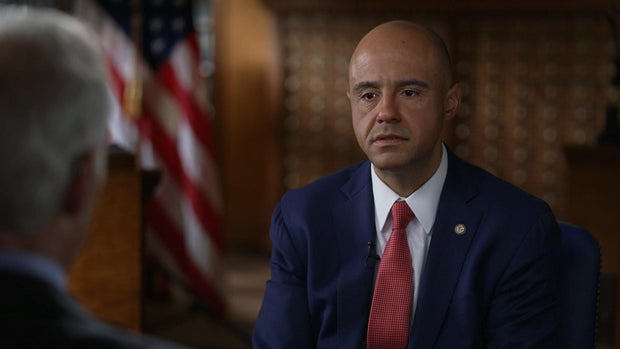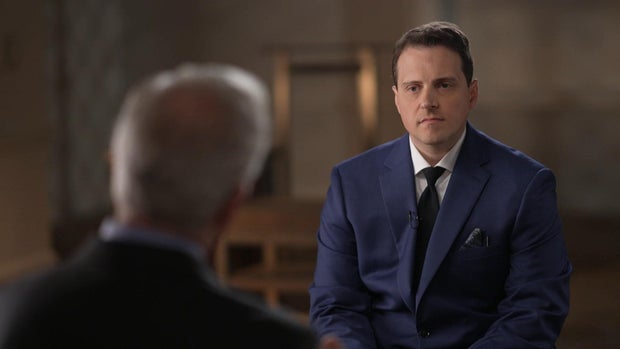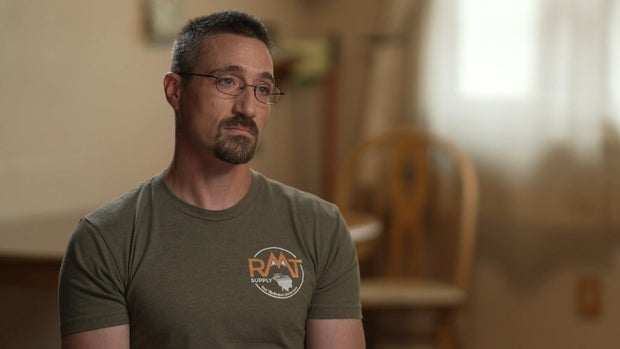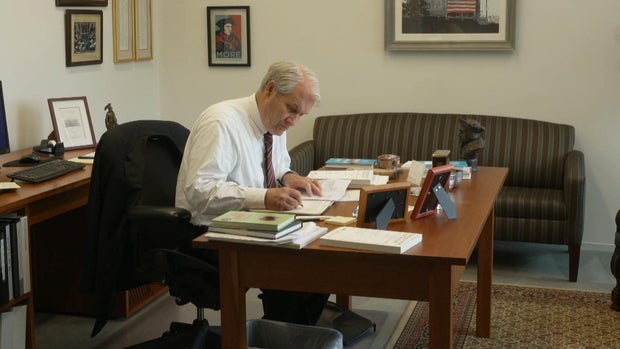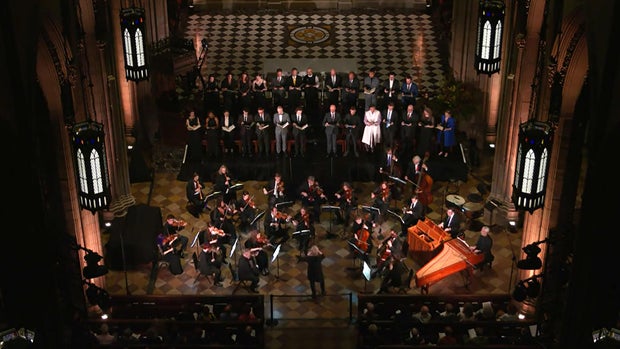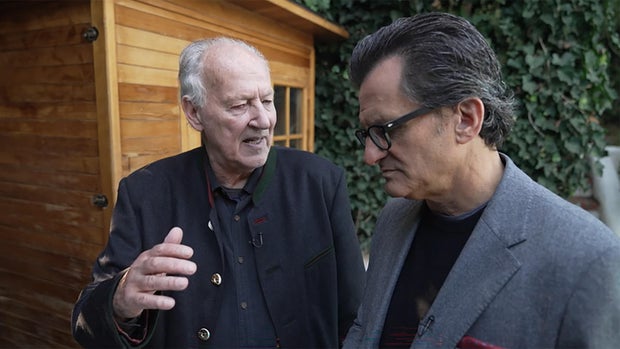CBS News
U.S. attorney explains Jan. 6 Capitol riot prosecutions

More than 1,000 Americans have been convicted in the January 6th, 2021 attack on the Capitol. About 350 trials are still pending and the FBI continues its dragnet for suspects. The attack that stopped the count of the presidential vote triggered the largest prosecution in U.S. history. But now, history is being challenged. Former President Donald Trump calls the convicted, “patriots” worthy of pardons. What is the evidence? We begin with the prosecutor in charge. U.S. Attorney Matthew Graves told us what drives the prosecution of January 6th.
Matthew Graves: The crime was severe. It was an attack on our democracy. Once you replace votes and deliberation with violence and intimidation, you’ve lost the democratic process. You’ve lost the rule of law. But it’s also about the victims, the officer victims who were injured that day, and making sure we hold people accountable for the harm that they inflicted on the 140 officers who reported physical injury.
Matthew Graves has worked in the Bush and Biden Justice Departments. Now, as U.S. attorney for the District of Columbia, he’s won more than 1,000 January 6th convictions and lost only two of the cases at trial.
Scott Pelley: What is the best evidence that you’ve had?
Matthew Graves: The crimes that occurred that day are probably the most recorded crimes in all of our history. You also have the words of the defendants explaining what they were going to do or what they had done.
60 Minutes
Evidence from the trials show many in the mob were determined to stop the count of the electoral vote that would certify Joe Biden’s victory. They were enraged by President Trump’s false claims of a stolen election.
Scott Pelley: You must’ve felt strongly to drive 2,000 miles to Washington.
Jerod Hughes: Yes, sir. I still feel very strongly.
Jerod Hughes came from Montana. He’s a married, 39-year-old construction worker with a daughter and a grievance.
Jerod Hughes: The way this country’s headed, my paycheck– you know, my wife’s disabled, and it’s been hell for us to try to, you know, try to make it with the tens of thousands of dollars of medical bills, you know? And a lot of us see Donald Trump, the outsider, comin’ in and tryin’ to– and tryin’ to help us out, tryin’ to help the little guy out against the big government.
That’s Jerod Hughes at lower right in the khaki cap, among the first inside the Capitol. That’s Hughes, inside, at the door, kicking it out so the mob can rush in.
Jerod Hughes: You guys don’t want this. You don’t f***ing want this! And we are f***ing mad! We are mad!
Jerod Hughes: No matter how I look at it, I share some of the responsibility for everything that happened that day, letting people in, being a part of that mob. I didn’t personally fight any cops or engage with any officers, but I have a lot of family that are police officers. I have a tremendous amount of respect for police, and I did not like seeing them being assaulted.
Scott Pelley: We didn’t see a lot of respect for police in that video.
Jerod Hughes: Well, no. Absolutely. I mean, I’ll hold my hand up and say I was wrong. I should not have been screaming at those cops. It’s not somethin’ I’m proud of.
Others did much worse.
Daniel Hodges: I became trapped. They pinned me against the door frame, and with my arms at my side I couldn’t mount any kind of defense.
Officer Daniel Hodges of D.C.’s Metropolitan Police defended an entrance known as the West Front Tunnel.
60 Minutes
Daniel Hodges: Someone was pinning me with a police shield, and another member of the crowd grabbed my gas mask by the filter in front and just started essentially punching me in the face while holding onto it, and then eventually ripped it off my head-And then he stole my riot baton out of my hands and beat me in the head with it.
Scott Pelley: What were you defending?
Daniel Hodges: Democracy.
Democracy stopped for about six hours. The vote was counted at 3:44 a.m. With two weeks until inauguration day, it was the Trump Justice Department that set the standards for the prosecutions. Decisions were made by “career” prosecutors who work at Justice for years regardless of who the president might be.
Matthew Graves: The career prosecutors quickly realized that you needed guidelines in place, determinations about who was gonna be charged, who wasn’t gonna be charged, and what they would be charged with. That process started in January 7th, 2021, during the prior administration. To this day, we continue to use guidelines that the career prosecutors put in place during the prior administration.
Scott Pelley: And how do they guide you?
Matthew Graves: what we’re generally focusing on, of the thousands of people who you could potentially charge that day, are people who actually entered into the Capitol, people who engaged in violent or destructive behavior, people who illegally carried firearms or other weapons on Capitol grounds, and people who helped others to get into the Capitol building.
Scott Pelley: You’re not charging everyone who was there that day?
Matthew Graves: That is correct. We have turned down hundreds of cases where the FBI is saying, there is evidence here, it’s your determination, prosecutors, whether you think this should be prosecuted.
Scott Pelley: And why would you turn them down?
Matthew Graves: Because they don’t fit within the guidelines that the career prosecutors had been using, or we don’t think that there’s sufficient evidence to prove the case beyond a reasonable doubt.
U.S. Attorney Matthew Graves told us that January 6th charges range from, essentially, trespassing, to the most serious, seditious conspiracy.
Matthew Graves: So seditious conspiracy is a Civil-War era statute that deals with basically using force against the government to interfere with the operations of the government.
Fourteen have been convicted of seditious conspiracy. One, a militia leader, got 22 years, the longest sentence of all. All of the trials have been in open court in Washington before judges or juries, the defendant’s choice. but more than 900 — 80% — have pleaded guilty.
Matthew Graves: And we’ve seen defendants in January 6th take full advantage of all the protections afforded under the constitution. To me, that’s the picture of due process.
But “due process” is not the picture painted at Trump rallies, including this last March.
Announcer: “Ladies and gentlemen, please rise for the horribly and unfairly treated January 6th hostages.” “Oh, say can you see by the dawn’s early light…” “At the twilight’s last gleaming…”
That’s a recording of defendants in jail. Mr. Trump has said that he’s “inclined to pardon many of them.”
Former President Donald Trump (during March 2024 rally): Well, thank you very much and you see the spirit from the hostages and that’s what they are, is hostages, they’ve been treated terribly and very unfairly, and you know that and everybody knows that and we are going to be working on that, soon as, the first day we get into office, we’re going to save our country we are going to work with the people to treat those unbelievable patriots and they were unbelievable patriots and are…
The former president has also revised the history of those who died.
One of his supporters was killed by an officer defending the House chamber. Three other Trump supporters died that day—one drug overdose—two from cardiovascular disease. And a police officer died of a stroke the next day. In the debate, Mr. Trump acknowledged one death, but he said this in August.
Former President Donald Trump (during August news conference:) When you compare them to other things that took place in this country where a lot of people were killed. Nobody was killed on January 6th.
Former President Trump is, himself, a January 6th defendant in a separate prosecution led by Special Counsel Jack Smith. Trump was indicted by a grand jury for allegedly conspiring to overturn the election with lies he knew were false -the same myths that stoked rage in Jerod Hughes.
60 Minutes
Scott Pelley: Where were you getting all of this information?
Jerod Hughes: Well, a lot of Fox News, a lot of stuff that I read on the internet. Obviously, Trump himself, you know, saying that the election was stolen.
Fox News paid $787 million to settle a suit that claimed that Fox repeatedly lied about the election and knew it.
Scott Pelley: Were the January 6th protesters duped?
Thomas Griffith: Yes.
Thomas Griffith is a conservative, retired, federal judge who co-authored, “Lost, Not Stolen,” a year-long investigation by conservatives into the 2020 election.
Thomas Griffith: The conclusion of the report was that there’s no evidence that fraud changed the outcome of an election in any precinct in the United States of America.
Scott Pelley: In any precinct?
Thomas Griffith: And all of the evidence, not the speculation, not the conspiracy theories, all the evidence points in one direction. And that is that President Biden won, and President Trump lost.
Judge Griffith was appointed by George W. Bush to the Court of Appeals for the D.C. Circuit. He retired in 2020 after working for years with most of the 29 judges who have heard January 6th cases.
Thomas Griffith: None of these judges is politically biased. These defendants had every chance in the world to defend themselves against these charges. And they didn’t succeed.
Scott Pelley: You seem to be saying that justice was done.
Thomas Griffith: Absolutely, justice was done.
60 Minutes
Justice for Jerod Hughes meant turning himself in and pleading guilty to obstruction of an official proceeding. The Supreme Court struck down that charge in another case. But if Hughes appeals, he’ll face other charges that prosecutors dropped. So, after 20 months in custody, including prison, he’s decided to just wrap up his last days of home detention.
Jerod Hughes: If I come to find out that I was dead wrong on this, that the election was actually legit and Joe Biden got the most votes in presidential history, I would be extremely embarrassed. I would hold my hand up and say, “I was wrong, and I was an idiot.” I don’t believe that though. And whether I was right or wrong, I– I believe what we did was patriotic, because we truly believed that the election was stolen, for a number of reasons. We really believed that.
Though the vote count was delayed, the transfer of power was on time with a new president emerging from that same West Front Tunnel defended by Officer Daniel Hodges.
Daniel Hodges: If these defendants are pardoned, then so much of what they believe or believed on that day will be justified in their heads that if they do it again that they’ll be protected. And it would be just incredibly destructive for the fabric of the country.
Now, the trials, themselves, will be judged by voters who will decide whether the defendants were prosecuted as criminals or choir boys.
Scott Pelley: The allegation is made that the White House is guiding your work.
Matthew Graves: I’ve never met President Biden let alone talked to him which is normal I would add because there are walls for very good reasons between the Department of Justice and the White House so that prosecution can focus on what it should be focused on, whether there are violations of law, and whether those violations of law consistent with the rules that we follow should be federally prosecuted.
Scott Pelley: There are people, maybe millions of people in this country, who are skeptical about what you just said.
Matthew Graves: No one is being prosecuted for their views. They’re being prosecuted for their acts.
Editor’s Note: D.C. Metropolitan police officer Daniel Hodges spoke in his personal capacity and not on behalf of his employer or the District of Columbia.
Produced by Aaron Weisz. Associate producer, Ian Flickinger. Broadcast associates, Michelle Karim. Edited by Daniel J. Glucksman.
CBS News
Former “That ’70s Show” star Danny Masterson appeals rape conviction

Actor Danny Masterson, who is serving a sentence of 30 years to life in prison, is seeking to overturn his conviction for the rape of two women, with his attorneys arguing he did not receive a fair trial.
A Los Angeles jury found Masterson guilty last year of two counts of rape by force or fear for assaulting two women at his Hollywood Hills home in separate incidents in 2003 — during the same time he was starring on the Fox TV’s “That ’70s Show.” The jury deadlocked on the case involving a third alleged victim. The May 2023 trial followed a mistrial in November 2022.
Masterson, 48, is incarcerated at California Men’s Colony, a minimum- and medium-security prison in San Luis Obispo County.
Cliff Gardner, the attorney handling Masterson’s appeal, filed an appellant’s opening brief Tuesday that alleges witnesses told different versions of their stories over time. The brief also argues that evidence that would have helped Masterson’s defense was not presented due to what Gardner describes as erroneous rulings by the court. Gardner argues in the court filings that those factors support reversing the convictions.
LUCY NICHOLSON / Getty Images
Masterson’s defense argued at trial that he knew both women socially and his sexual relations with them were consensual.
“It is true, of course, that a defendant is not entitled to a perfect trial. He is, however, still entitled to a fair one,” the brief reads. “Danny Masterson received neither. Reversal is required.”
During the trial, one of the women Masterson was later convicted of raping broke down on the witness stand as she testified that he choked her and smothered her with a pillow when she tried fighting back as he assaulted her, according to the Associated Press.
“I could not breathe,” she said, crying.
When the prosecutor asked what she was thinking at the time, she said she feared for her life, AP reported.
“That he was going to kill me,” she said. “That I was going to die.”
She later testified Masterson took out a gun from inside his bedside table and told her to be quiet when they heard voices at the door. She told jurors she was in and out of consciousness through the night.
Masterson and the victims were members of the Church of Scientology, which became a central focus of the case as the women alleged they were stalked and harassed after reporting the allegations to police.
They sued Masterson and the church years earlier in connection with those accusations.
During the trial, Deputy District Attorney Reinhold Mueller told jurors the church had retaliated against the victims for reporting the the crimes — the rape of a 28-year-old woman in April 2003 and assault of a 23-year-old woman, also that year.
“What happened after they were drugged, they were raped by this man over here,” Mueller said, as he pointed across the courtroom toward Masterson during closing arguments. “You have an opportunity to show there is justice. It does exist.”
The church released a statement at the time refuting the allegations.
“The church has no policy prohibiting or discouraging members from reporting criminal conduct of anyone, Scientologists or not, to law enforcement,” the statement reads. “Quite the opposite, church policy explicitly demands Scientologists abide by all laws of the land. All allegations to the contrary are totally false.”
In the newly filed brief for Masterson’s appeal, Gardner alleges the victims changed their stories “dramatically” over the years and had a financial motive to do so. Gardner argues in court documents that though the statute of limitations to file a lawsuit seeking damages had expired before the trial, under state law it would be revived if Masterson was convicted of forcible rape involving multiple victims.
Gardner says in the brief that a court ruling prevented evidence related to that argument from being admitted at trial.
He also states in the court filings that some witnesses died before the case went to trial, more than a decade after being reported to law enforcement, and alleges that police lost a tape-recorded witness interview that would have helped Masterson’s defense.
After the six-day trial resulting in Masterson’s convictions, one of the women he was convicted of raping released a statement saying she was relieved he had been found guilty.
“I am experiencing a complex array of emotions – relief, exhaustion, strength, sadness – knowing that my abuser, Danny Masterson, will face accountability for his criminal behavior,” said a statement from one of the women whom Masterson was convicted of raping at his home in 2003.
CBS News
This week on “Sunday Morning” (December 22)

The Emmy Award-winning “CBS News Sunday Morning” is broadcast on CBS Sundays beginning at 9:00 a.m. ET. “Sunday Morning” also streams on the CBS News app beginning at 11:00 a.m. ET. (Download it here.)
Hosted by Jane Pauley
Trinity Church
COVER STORY: The story of Handel’s “Messiah”
Since its premiere in 1742, George Frideric Handel’s “Messiah,” a 3.5-hour work for chorus, soloists and orchestra that includes the “Hallelujah Chorus,” has become one of the most-heard pieces of classical music on Earth. Correspondent David Pogue looks back on the creation of this masterwork with author Charles King and conductor-musicologist Jane Glover, and examines how Biblical passages assembled by a wealthy English landowner suffering from doom and despair would, in the hands of the German-British opera composer, become a timeless message of hope, and a Christmas tradition.
For more info:
ALMANAC: December 22
“Sunday Morning” looks back at historical events on this date.
ARTS: In Asheville, N.C., gingerbread houses reflect community spirit
For more than three decades, Asheville, North Carolina, has hosted the National Gingerbread Contest, a celebration of Christmas, creativity and carbohydrates. The flooding brought by Hurricane Helene this past fall cancelled the contest, but what had been a destination event for bakers and spectators has become an ad hoc celebration of Asheville. Forty-one gingerbread creations have been placed around town to help bring holiday cheer (as well as attract donations and tourist dollars) to the struggling city. Correspondent Conor Knight reports.
For more info:
CBS News
MOVIES: Werner Herzog keeps working, predicts: “You have to carry me out from a set feet first”
Visionary director Werner Herzog has made more than 20 feature films and more than 30 documentaries. But it wasn’t movies that prompted the German-born filmmaker to move to Los Angeles; it was love. He talks with Turner Classic Movies host Ben Mankiewicz about his recent memoir, “Every Man for Himself and God Against All”; about the epic making of his 1982 classic, “Fitzcarraldo”; and why he enjoys acting – when he gets to play the villain.
For more info:
HEADLINES: Why drone hysteria has taken off
By most accounts, alleged drone sightings have been multiplying exponentially, with more than 5,000 reported in just the past few weeks. But experts say the majority of reports about unusual lights in the sky are probably anything but drones. Correspondent Tom Hanson reports.
For more info:
PASSAGE: In memoriam
“Sunday Morning” remembers some of the notable figures who left us this week.
WORLD: West Bank settlements, and the expanding divide of Israelis and Palestinians
Inside the occupied West Bank, the Israeli settlement of Karnei Shomron is one of more than a hundred carved into Palestinian land. Today, upwards of 700,000 Israelis live in communities scattered inside the West Bank and East Jerusalem, which the United Nations calls illegal. About 15% of settlers are Americans. Correspondent Seth Doane talks with two settlers, originally from West Virginia and Detroit, and with Palestinians in the West Bank now living on the other side of an Israeli security barrier.
For more info:
MGM/Criterion
COMMENTARY: Bob Dylan’s enduring love affair with the movies
The iconic Bob Dylan has long been a silver screen presence – as an actor, a subject of documentaries, and as portrayed by Hollywood heavyweights, from Christian Bale to Timothée Chalamet (star of the new biopic “A Complete Unknown”). But as historian Douglas Brinkley points out, Dylan’s love of movies has been a recurring theme in his art, and his persona, all his life.
To watch a trailer for “A Complete Unknown,” click on the video player below:
For more info:
SUNDAY PROFILE: Darren Criss
Kelefa Sanneh reports.
You can stream the holiday album “A Very Darren Crissmas” by clicking on the embed below (Free Spotify registration required to hear the tracks in full):
For more info:
MUSIC: A Darren Criss performance
COMMENTARY: Reflections on the messages of Christmas and Hanukkah
Wednesday will mark both Christmas Day and the first night of Hanukkah. Mariann Budde, Bishop of the Episcopal Diocese of Washington, D.C., and author and rabbi Steve Leder, of Los Angeles, offer their thoughts on what the holiday season means to us all.
For more info:
MUSIC: Darren Criss performs with the Young People’s Chorus of New York City
NATURE: TBD
WEB EXCLUSIVES:
FROM THE ARCHIVES: Hollywood Legends IV (YouTube Video)
Watch more classic “Sunday Morning” interviews with some of the film industry’s most luminous stars. From 2014, Leonardo DiCaprio talks about the making of “The Wolf of Wall Street”; from 2012, Jane Fonda discusses what she calls her “third and final act”; from 2015, Russell Crowe talks about his first film as a director, “The Water Diviner”; from 2010, Harrison Ford describes stardom and his responsibility to his audience; and from 2018, Denzel Washington discusses his career on screen and on stage, as he appears in a Broadway revival of the Eugene O’Neill classic, “The Iceman Cometh.”
The Emmy Award-winning “CBS News Sunday Morning” is broadcast on CBS Sundays beginning at 9:00 a.m. ET. Executive producer is Rand Morrison.
DVR Alert! Find out when “Sunday Morning” airs in your city
“Sunday Morning” also streams on the CBS News app beginning at 11:00 a.m. ET. (Download it here.)
Full episodes of “Sunday Morning” are now available to watch on demand on CBSNews.com, CBS.com and Paramount+, including via Apple TV, Android TV, Roku, Chromecast, Amazon FireTV/FireTV stick and Xbox.
Follow us on Twitter; Facebook; Instagram; YouTube; TikTok; and at cbssundaymorning.com.
You can also download the free “Sunday Morning” audio podcast at iTunes and at Play.it. Now you’ll never miss the trumpet!
CBS News
Andrew Cuomo sues woman who accused him of sexual harassment for defamation
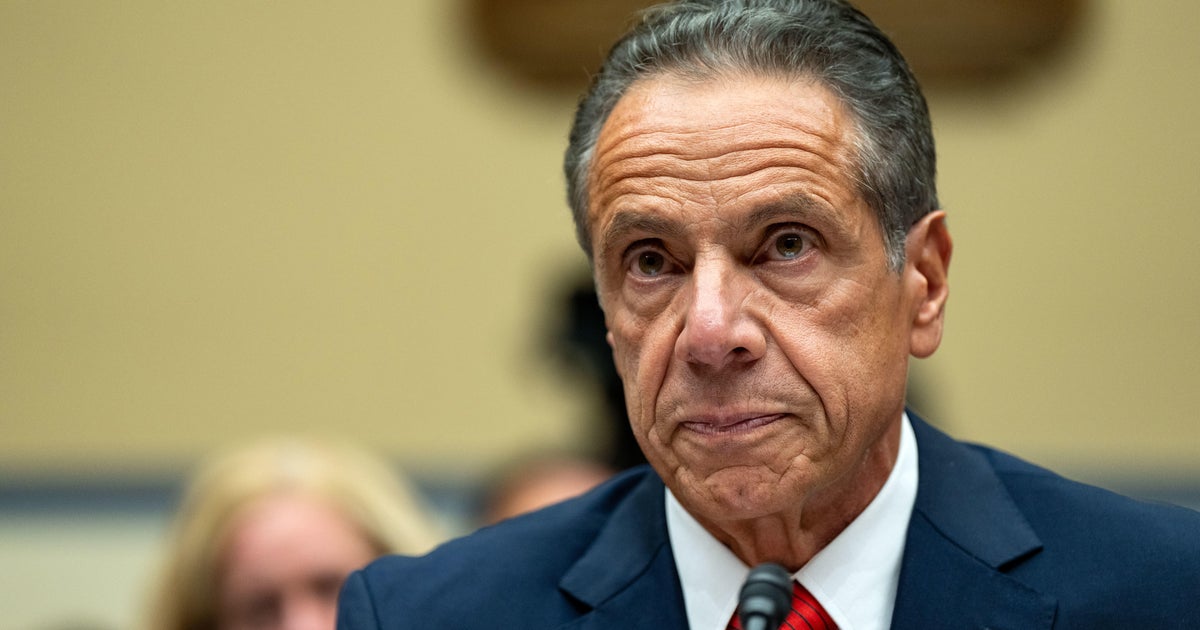
Former New York Gov. Andrew Cuomo filed a lawsuit Thursday against a former aide who alleged he sexually harassed her in 2020. His legal filing came just days after she withdrew her own lawsuit against him.
In the filing, Cuomo’s lawyers claimed Charlotte Bennett, a former executive assistant in his office, lied about him making sexual advances toward her.
“Governor Cuomo did not make any sexual advances toward Bennett and did not sexually harass her,” his lawyers wrote in a notice filed in New York state court on Thursday.
Bennett was the second woman to accuse the then-governor of sexual harassment, which she said included telling her he was “lonely” and asking her if she would be open to sex with an older man. She described Cuomo as “a textbook abuser” who made her “deeply uncomfortable.”
After Bennett went public with her allegations in March 2021, Cuomo held a press conference where he said he felt “embarrassed” and that he “never knew at the time I was making anyone feel uncomfortable.”
In Thursday’s filing, his lawyers wrote the former governor faced “a cascade of harm” as a result of Bennett’s allegations.
Cuomo resigned in August 2021 after New York’s attorney general released the results of an investigation that concluded he had sexually harassed at least 11 women, including Bennett.
When that investigation came out, Cuomo denied ever sexually harassing women. “The facts are much different than what has been portrayed,” Cuomo said at the time. “I never touched anyone inappropriately or made inappropriate sexual advances.”
Last week, Bennett dropped a separate federal suit she had filed in 2022 accusing Cuomo of sexual harassment. In a statement posted by her attorney on X, Bennett cited “invasive discovery requests” made by Cuomo’s legal team that included her medical records from more than a decade ago.
In their filing today, Cuomo’s attorneys note that their discovery requests fell “under the rules that govern all federal lawsuits. They alleged Bennett dropped her suit to avoid being deposed and to “shield the overwhelming evidence of her false claims from ever becoming public.”
Cuomo’s notice said “Bennett’s claims were … exposed as a sham through the discovery process.”
As part of her statement last week, an attorney for Bennett said she would still be pursuing a case against the state of New York, her employer at the time of the alleged harassment. In a separate statement, Bennett called Cuomo’s legal filings “abusive.”
“Throughout this extraordinarily painful two-year case, I’ve many times believed that I’d be better off dead than endure more of his litigation abuse, which has caused extraordinary pain and expense to my family and friends,” Bennett said. “I desperately need to live my life.”


